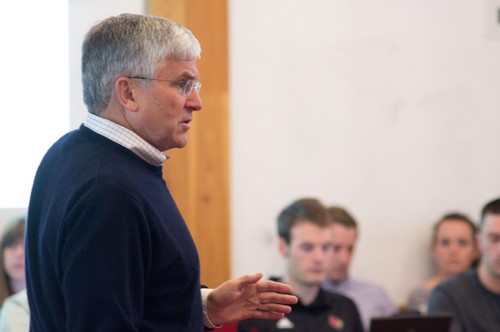 Photo by: Ryan Lumpkin
Photo by: Ryan Lumpkin
General George Casey, former Chief of Staff of the U.S. Army and DU alumnus, recently completed teaching his two-week course on Civil-Military Relations at the Josef Korbel School of International Studies, which took place March 26-April 6.
The class, Civil-Military Relations In a Time of War, was announced a week before the start of the Spring quarter. The 35 slots filled almost instantly.
This is the first class General Casey has ever taught. The idea for it came from a talk last year with Christopher Hill, the dean of the Korbel school, when General Casey was on campus to receive the Evans Award.
“I said I was interested in teaching, but I wasn’t necessarily ready to commit to a full semester so early in my retirement,” said Casey. “So Chris Hill said, ‘why not a few weeks?’ He strongly suggested I try to teach a class just to see how it feels.”
The course topic draws on Casey’s experiences as a military leader who must be able to communicate effectively with civilians within the government.
“I thought it was something I could bring real perspective to because I’ve been involved with the highest levels of our government,” said Casey. “There’s a lot of experience I can share.”
Jason Thomas, a graduate student at Korbel studying International Security, said it is his perspective and insight that attracted many students to take his class.
“It’s nice to get an idea of the personalities of our leaders,” said Thomas. “He had a lot of power and is a very determined individual, but he’s also very approachable. A lot of people might not expect that.”
Casey received his MA in International Relations in 1980 from Korbel. He had already been in the army for eight years before coming to DU.
“I had been in an infantry battalion the whole time, in the most mundane levels of the army,” said Casey. “I was asking myself, there had to be more than this. I was looking for a broadening experience, and was offered grad school. So I came here.”
He said he believes his time at DU gave him the experience needed to navigate civil-military relations as he moved up the chain of command.
“The military is a very closed society,” he said. “Sometimes we have difficulty relating to those outside. I had the ability at DU to talk to people who were one, civilian, and two, had fundamentally different views.”
When it comes to being on the other side of the academic equation, however, Casey said there is a bit of a learning curve.
“Teaching is a lot harder work than I thought it would be, but I really enjoy it,” said Casey. “I really enjoy the inquisitiveness and the thoughtfulness of students. I’m doing guest teaching about once a day, too, so about a quarter’s worth in two weeks. It’s interesting for me to come to an academic environment after being a practitioner. It gives me time to think in depth about what I’ve done in my career.”
After teaching the class, Casey said he hopes to write a book about his experiences, in addition to traveling to teach at other companies and organizations about leadership in high-level positions. For Casey, leadership is an important element for success.
“I encourage all students to look for opportunities to lead,” said Casey. “In the military, we give young men and women huge responsibilities from the time they walk in the door. When you lead, you grow.”
He also emphasized college students are building the foundations for their futures through their experiences.
“You’re here building intellectual capital that you will trade on for the rest of your life,” said Casey.











